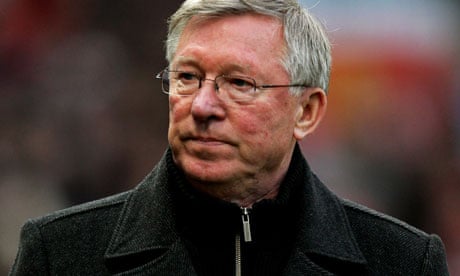Sir Alex Ferguson began "co-operating" with the News of the World several years ago after the paper obtained the Manchester United manager's medical records, a former reporter at the title told the Leveson inquiry on Monday.
Matt Driscoll, who was a senior sports journalist, claimed that the paper used "blagging", or impersonating a third party, to secure the confidential information after receiving a tip that Ferguson might be suffering from ill health. He said the paper had agreed not to run a story after contacting Ferguson.
"It was put to Alex Ferguson that we wouldn't use this information and in the end it was mentioned to him we would keep it quiet and keep it out of the public domain and because of that he then started co-operating with the paper," Driscoll told the hearing into press standards.
The former sports journalist appeared to reveal the manager's name by mistake. A spokeswoman for the club said Ferguson was aware of what had been said at the inquiry but had no comment to make. "We are not saying anything," she said.
Driscoll won nearly £800,000 after an employment tribunal decided in December 2008 that he had been unfairly dismissed by the paper in April the previous year. It was not clear from Driscoll's evidence when the events he described involving Ferguson occurred.
He told the inquiry that he had been unable to stand up a tip about a prominent manager's health and told the sports desk he was unable to write a story about it.
"My sports editor said 'Leave it with me, I can see what we can come up with'," Driscoll said. "That same day I got a call from the sports editor who said: 'You're absolutely right, the story is true, I've got his medical records with me at the moment.' "
Driscoll added: "I was told that sometimes you'd get a situation where if an investigator sent a fax to a GP or a hospital saying 'I'm his specialist, I need these details', it was incredible how often that would just get sent straight back."
Driscoll emphasised he did not believe it was the sports editor who had "blagged" the information.
He said "there were specialist people at the News of the World who did that sort of stuff".
He added: "Information is a tradeable commodity. [It enables the paper] to say 'we've got information, we won't use it as long as you co-operate', which is the kind of deal that was being done there."
Driscoll said he had no knowledge of private investigators being used by the News of the World.
He said journalists never questioned the ethics of techniques used or their editors' decisions.
"The editor can make you look very good and he can also make you look very bad," Driscoll said. "He decides who gets the tips, who gets the stories to work on. He also decides whether your copy gets in the paper or not."
Driscoll said he went from being hailed as a very successful journalist to being told he was unsatisfactory.
He said that despite there being no evidence that he was under-performing, once an editor decides "your face doesn't fit any more", the journalist's time is up.
Driscoll was signed off work with stress-related depression in July 2006 and dismissed in April 2007.
He said the tribunal had "finished" his career in journalism because he was seen as "the guy who's taken on the bosses".
Driscoll also said he had received an anonymous email which claimed his mobile phone may have been hacked.
He told the inquiry that he had contacted police, who said there was no initial evidence but they would get back in touch with him at a later date.
Driscoll said his depression was "entirely" down to working conditions at the newspaper.
"I was a fit and healthy person until 2005," he said.
He also denied that he had an "axe to grind" against his former employer, and claimed he was simply "unhappy" that journalists were being forced to take the blame for the phone-hacking scandal.
News International chose not to comment.
Before Driscoll worked for the News of the World from June 1997 to April 2007 he had previously worked for the Daily Star.
"When I was there the Daily Star had a very small budget compared to the rest of Fleet Street," he said.
"They could not really afford to spend a lot on news gathering and certainly the use of any of the 'dark arts' as they now seem to be called, the Daily Star wouldn't have been able to afford that even if they wanted to."
The Leveson inquiry will hear evidence on Tuesday from Piers Morgan, the former Daily Mirror and News of the World editor turned CNN interviewer. He will appear via video link from Los Angeles.
